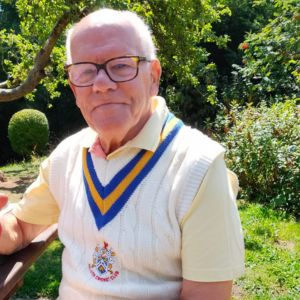Rod Marsden has spent most of his working life in education, a career that needs leadership, compassion and care. Working at three different primary schools in the 90s as a Headteacher, his mental health started to decline during his third headship.
The school was challenging when he arrived, but Rod brought a quiet resolve, introducing a new maths scheme, standardising the school uniform and helping settle financial problems.
The school quickly began to thrive but Rod began to struggle with feelings of inadequacy and the pressure and workload began to take their toll.
Rod remembers:
“The mistake I made was not talking about how I was feeling to anyone, I kept everything inside. I was still managing to function at work but one Sunday night my wife had been away for the weekend and she returned excited to share stories with me, but instead of listening to her, I greeted her coldly and snapped that I was too busy to listen to her.
Very shortly afterwards I walked into school early one morning and then walked out without speaking to anyone and tried to quit and hand my notice in. They initially calmed me down, reassured me I was capable, and I sought help from my GP and gave myself until Christmas as a target to get better.”
Rod was hopeful he would feel better for Christmas but that wasn’t the case, and Rod had to stop working as his mental health decreased. Rod’s first experiences of accessing help weren’t wholly positive although he was prescribed medication from his GP, a local support group told Rod his ‘problems weren’t big enough’ and he was left feeling disengaged.
Over the next couple of months Rod’s depression got deeper, he comments:
“As my depression got worse I began to struggle to do everyday tasks. I couldn’t answer the front door or speak on the phone. My personal hygiene suffered as I wasn’t showering and kept wearing the same unwashed clothes. I felt guilty ashamed and constantly compared myself to others and felt worthless.
I was offered six sessions of ECT (electroconvulsive therapy) but I found in ineffective and distressing, and I couldn’t see a way out of my depression as despite increasing my dosage of medication for months I felt like I wasn’t getting any better.”
After a day out with his family, Rod tried to take his own life. Thankfully Rod survived and after 3 days in hospital he was discharged and it was here that Dr Green began to help Rod on his recovery journey.
Rod recalls:
“Dr Green explained depression to me in a way that nobody else had done before. He said depression is like a tap that is constantly running and until you learn to control the flow your depression won’t get any better. This simple explanation had such a profound impact on my recovery, I finally felt seen and heard.”
Bit by bit Rod began to recover and regain his confidence and sense of worth. He found a sense of purpose when he became involved with a talking newspaper and began caring for his terminally ill father-in-law.
Over the next 15 months, the fog began to lift and Rod felt ready to return to part time work, work he continued to do for the next 14 years before partial retirement.
During his illness Rod felt supported by one friend and colleague in particular,
Rod explains:
“When I recovered, I wanted to take my friend out for lunch, she helped me in some of my darkest moments, helping me attend appointments, listening to me and helping me remember this time in my life as she kept a diary. I took her out for lunch as a thank you and I promised her I would do this every year, and this year will be the 30th year of our traditional lunch.”
Now in his 80s Rod remains active and purposeful, he’s a Chair of Governors at a local school, enjoys spending time with his grandchildren and keeping fit. Talking openly about his experiences is something Rod does when he delivers talks to NHS staff and local communities. He often wears a suit to challenge the assumption that suicide only affects certain people, suicide and depression can affect anybody, it is an illness and not to feel ashamed.
Rod adds:
“Throughout my recovery journey I developed on my own tips to help with my depression, these might not work for everyone, but you can recover, if I can so can you.
- Love yourself and take pride in your appearance, a shower a day keeps the doctor away
- Take your medication
- List all the things you have achieved, however insignificant they may seem
- Don’t rush, it will take time
- Don’t be too proud to accept help and act on the advice given
- Try and exercise, even just a short walk. If you are unable to get outside do something in the house
- Share your thoughts, however dark they are
- Keep a diary of your progress
- Find things to look forward to and have treat days”
Rod remains humble about his journey and concludes:
“If sharing my story can help one person and aid or start their recovery journey then that would be a great success. I want to demonstrate that suicide can affect anyone, any age, gender and background but I’m proof that recovery is possible.”

